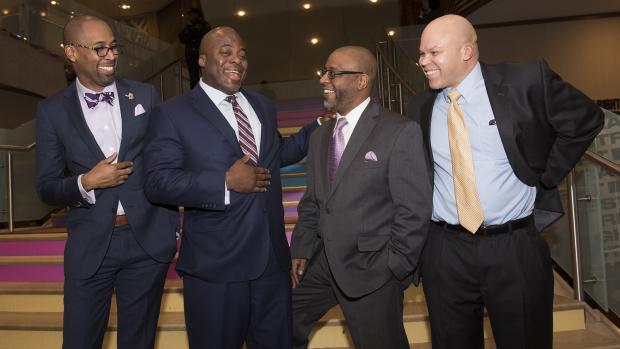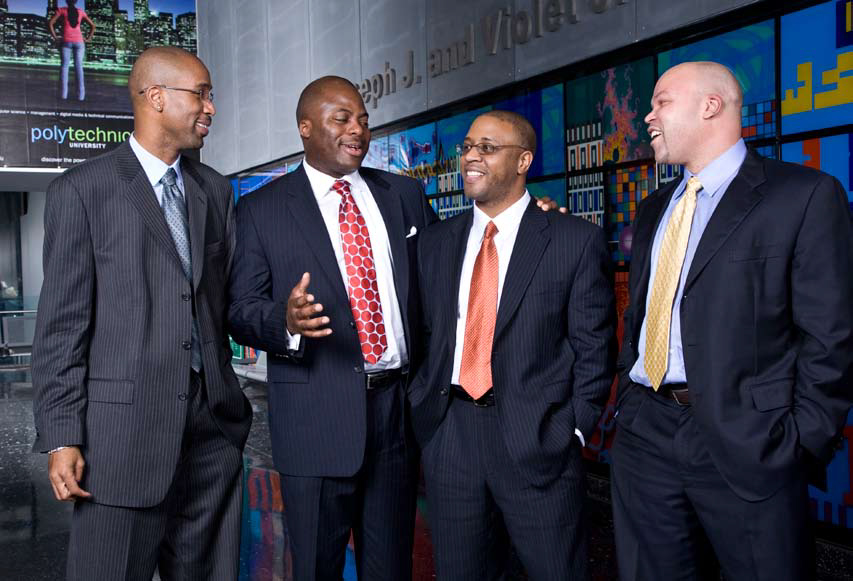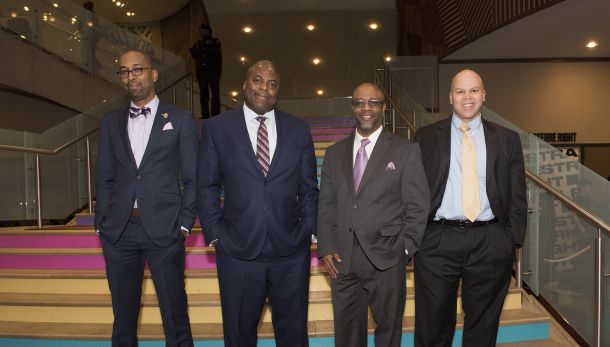Four Alums Share More than a Quarter-Century of Friendship, Growth, and Achievement
Revisiting Quartet of Grads Highlighted in 2008 Alumni Magazine

If you’ve ever stood in a supermarket checkout line, you might know the guilty pleasure of browsing a celebrity magazine with headlines proclaiming “Where Are They Now?” to find out what your favorite movie and music stars of the past have been up to.

The four friends featured in a 2008 edition of Cable, the Polytechnic alumni magazine
Luckily for us, at NYU Tandon, when we revisit our own superstars — alumni whose lives and careers we’ve followed avidly — we feel no guilty pleasure, just pure unalloyed pride. Where are they now? The answer is generally that they are busy making contributions to their communities, solving pressing societal problems, and advancing important careers.
When David Campaña (’94 MA), Dele Oladapo (’93 EE), Robert Stewart (’93 EE), and Patrick Xantus (’93 EE) were featured in the alumni magazine of what was then known as Poly in the winter of 2008, they had each embarked on exciting professions and held positions of great responsibility in the years after graduation. The cover of the magazine showed four confidently smiling young businessmen who had already amassed combined earnings and revenue for their employers in excess of $100 billion.
Campaña, who had earned an MBA from Columbia in 2007, was then serving as the Chief Architect and Chief Technology Officer for New York City’s Department of Finance; Stewart was the Director and Chief Patent Counsel for global banking giant UBS AG; Xantus had co-founded his own systems engineering, research, and analysis firm, General Infomatics, and was working in the capacity of VP and COO; and Oladapo was a VP of Corporate Technology Management for the well-known financial services company Prudential Financial, Inc.
Impressive titles aside, all were recording noteworthy accomplishment after accomplishment: Campaña, for example, oversaw the technology for a full third of the city’s earnings and was responsible for modernizing many of its 125 financial-based systems, while Stewart chaired a working group that was at the forefront of debate over U.S. patent reform and had testified before the House of Representatives. Oladapo, who had earned an MBA from Columbia in 2002, was charged with implementing and supporting enterprise software vital to Prudential’s trading platforms and call centers, and Xantus had helped NASA resolve data collection and business process deficiencies in the Space Shuttle program at SENTEL Corporation, led a multimillion-dollar data conversion effort for the North Carolina Department of Public Instruction while at PricewaterhouseCoopers, and pioneered the use of highly mobile data collection and software technology in large-scale public safety environments at the OPTIMUS Corporation before drawing upon his entrepreneurial spirit and striking out on his own.
Excellence in Engineering, Business, & Beyond
A decade later, and their accomplishments continue to accrue. Stewart, who earned a degree from Georgetown University Law Center after graduating from the School of Engineering, now heads an eponymous law firm that specializes in all aspects of intellectual property and is frequently called upon to address such important groups as the Institutional Investor, American Intellectual Property Law Association, American Bar Association, and Licensing Executive Society. Xantus has seen his company attract such high-profile clients as the U.S. Department of Defense and the Federal Aviation Administration. Oladapo has risen through the ranks at Prudential and now leads technology innovation and architecture for the company, and Campaña is currently a Management Consultant with Verizon, leading their delivery practice for their digital and mobile SMB market initiatives.
Someone not knowing them might assume that such distinguished professionals come from privileged backgrounds where accomplishment in the STEM fields is the norm, but that would be a mistake. Campaña was born in Harlem and grew up in the Washington Heights section of northern Manhattan, where crime and drug use were then rampant, and Stewart grew up in a Bronx neighborhood considered one of the city’s most dangerous. Oladapo was a first-generation American whose African name made him the subject of curiosity and teasing among his peers on Staten Island, where his parents had ultimately settled after coming to the U.S. from Nigeria. Similarly, Xantus was a first-generation Haitian-American who grew up in a home in which English was a second language.

From left: David Campaña, Dele Oladapo, Patrick Xantus, Robert Stewart
Each of them credits their friendship, their alma mater, and their membership in the student chapter of the National Society of Black Engineers (NSBE) with much of their success. “We learned together, grew together, identified internship opportunities through NSBE and eventually explored career paths together,” the four, who have remained close since their school days, assert. “There were few students of color at the school back then,” they recall, “and we provided invaluable support for each other. You could always feel comfortable at an NSBE meeting.”
While their fond memories are too numerous to recount, among them are the intense study sessions Oladapo hosted at his quiet Staten Island home (since Dibner Library was not yet in operation); Campaña’s habit of regularly wearing a suit and tie (which the others learned to emulate); and (much more recently) becoming godfathers to each other’s children.
Mentoring the Next Generation
They shun the idea that they are “self-made men.” “We’re proof of the power of a strong network,” they say. “No one does this alone; the concept of pulling yourself up by your own bootstraps is nice, but you need good mentors — someone to teach you how to format a resume and someone to model a strong work ethic.”
Despite the demands placed on them by their high-powered careers, the four have been committed to being those mentors for others. “We have always subscribed to the notion that each one should teach one, even in our student years,” they say. In 2008, when they were originally profiled, an entire page was devoted to Campaña’s recruitment of several School of Engineering students for internship spots at the Department of Finance. One of them, Calvin Young III, an NSBE student president who went on to graduate from Harvard Business School and run in a Baltimore mayoral race, said at the time: “Working with Mr. Campaña is especially rewarding because I can identify with his background. To see someone who is successful and walked a similar road is encouraging.” Campaña has continued such activities throughout the years, and he has been nationally recognized as a Luminary Honoree at the Hispanic Engineer National Achievement Awards Conference by Great Minds in STEM for his many contributions to the Hispanic technical community as a leader, mentor, and role model.
As members of Alpha Phi Alpha, the nation’s oldest fraternity for African-American college men, the group has also been active in Project Alpha, which provides role models and guidance for boys between the ages of 12 and 15. “We want them to know that there’s success outside the NFL,” Campaña explains, “and that anything they dream of doing is possible.“
Stewart points out that their life experiences and skills allow them to give back to their communities in numerous ways besides mentoring. For example, he engages in pro bono legal work for minority-owned businesses that might not otherwise have the benefit of such high-level expertise, and he sits on the advisory board of Innervation Finance, which offers financial services to businesses run by people from ethnic minorities, women, veterans, the disabled, and other underrepresented groups.
“Giving back is a two-way street,” they advise. “Professionally, we are all engaged in finding solutions that will improve people’s businesses and lives, so it behooves us to understand how the world works and what it needs, and mentorship and volunteerism are good ways to gain that understanding.”
So, where are they now? The answer is clear: They’re out there using their School of Engineering educations for the benefit of society and making us all proud, as well as eager to see what the next 25 years will bring for them.




